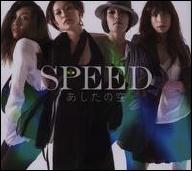Speed was formed in 1996 under the producer Hiromasa Ijichi and included four students of Okinawa Actors School, which trained Namie Amuro and Max. Hiroko Shimabukuro, who was 12 at the time and Eriko Imai were initially meant to be vocalists, and Hitoe Arakaki and the 13-year-old Takako Uehara were invited as dancers, but eventually all four girls started to sing for the band, which debuted on Toys Factory with the single Body Soul (1996). They never had to fight for the spotlight: their first release proceeded to sell 630,000 copies, sticking up in the charts for 31 week -- the longest run for a Speed single. The follow-up Steady (1996) propelled the band even higher, becoming their first million-seller, and the debut album Starting Over, out the next year, finished their conquest of Japan, topping the charts and selling close to two million copies. Another single Go! Go! Heaven (1997) followed (becoming their first number one hit) before the group debuted live, rewarding the fans' patience with a huge show complete with pyrotechnics and acrobatics. Further singles, the winter holiday themed White Love (1997) and the self-explanatory My Graduation (1998), hit the right spot with the Japanese audience, selling 1.8 million and 1.4 million copies, respectively, and the second album Rise (1998), which included these songs, repeated the debut's sales performance.
Speed kept the bar high by starring in the main roles of the cyber-romance movie #Andromedia (1998), which was a box office success in Japan; after its cinema run, the band went on a "Dome Tour," playing the nation's four biggest venues. However, signs of change revealed themselves by the time of their next release, the maxi-single All My True Love (1998), which included Speed's first tracks sung by individual members (as opposed to the usual teamwork). It turned out to be no disappointment at all, scoring number one and selling 1.2 million copies. The greatest-hits collection Moment, delivered in 1998, outsold it, shifting 2.3 million units, but it also marked a watershed: soon, Uehara debuted with a solo single, produced by Ryuichi Kawamura of Luna Sea, no less, and shifted over 500,000 copies in 1999. Arakaki soon followed her with her own solo record, but Speed wasn't over yet, releasing Breakin' Out the Morning (1999), which was their worst-selling single, albeit at a solid 582,000 copies. Shimabukuro then released her own solo debut single, which fell a little short of one million copies, and Kawamura continued to work with Uehara; before the end of the year, the group admitted the obvious and announced their disbandment, although it took effect only after a final single, tour, and album (Carry on My Way -- 880,000 copies). Still, they got together twice more, both times for a charity benefit; one of the temporary reunions even lasted long enough for the fourth album, Bridge, to be released in 2003. In 2008, Speed returned for good, boasting foreign songwriters in addition to Japanese ones. The first reunion single was Ashita no Sora, followed in 2009 by S.P.D., which was, however, a shadow of their former glory chart-wise, stopping at number eight and selling only 26,000 copies. ~ Alexey Eremenko, Rovi












